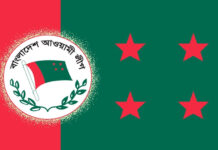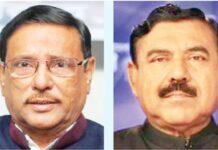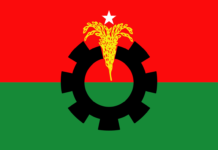Sadeq Khan
The prolonged political unrest in Bangladesh and siege of inter-district traffic, however nominal, is causing delays and damages to internal and external trade and other economic activity. Apart from the suffering and insecurity of the public throughout the country, the situation is being watched with trepidation and the international community voiced repeated warnings. The declaration of the election schedule of City Corporation Polls in Chittagong and Dhaka by the Election Commission at the behest of the government has made a difference. The agitating 20-party opposition has filed nominations for participation in the polls, while continuing its actions of “siege” countrywide, sparing the poll campaigns in Dhaka North, Dhaka South and Chittagong City constituencies.
On April 3, in response to questions raised concerning developments in Bangladesh, the spokesman for the United Nations Secretary-General Ban Ki-moon said that Mr. Ban welcomed the de-escalation of violence in Bangladesh in the past weeks. The Secretary-General is encouraged by the opposition’s decision to participate in the city council elections for Dhaka and Chittagong, scheduled for 28 April. He appealed to the authorities in all relevant institutions to ensure that the elections be transparent, inclusive, and credible.
Transparent and credible poll needed
The Secretary-General also expressed hope that political parties would soon find a way to overcome their differences for the sake of the country’s long-term development and stability and that the United Nations would remain fully committed to supporting Bangladesh in that regard.
On April 8, during the regular press briefing at the U.N., in response to a question about possible UN involvement in the impugned poll processes in Bangladesh, the UN Secretary General’s spokesman essentially repeated the same message. The questioner had asked: BNP is participating in city corporation polls; It’s chairperson Begum Khaleda Zia has returned to her home from confinement in her office. But the stance of government is one-sided. Leaders and activists of BNP are under harassment and trumped up criminal cases, their nominations are being cancelled, some are unable to collect nominations. There is no opportunity for free campaign. What is the observation of UN here?
In reply UN chief’s spokesperson said: UN could provide technical support in polls if governments want. Marking the ongoing situation as unusual, the Secretary General’s spokesman Stéphane Dujarric said: All political parties should reach an agreement for consensus. He called for equal opportunity in city polls for all parties.
In answer to questions raised concerning developments in Bangladesh, the spokesman repeated the earlier statement that the Secretary-General welcomes the de-escalation of violence in Bangladesh in the past weeks. He is also encouraged by the opposition’s decision to participate in the city council elections for Dhaka and Chittagong, scheduled for 28 April. He calls on the authorities to ensure that the elections will be transparent, inclusive, and credible, and he hopes that political parties will soon find a way to overcome their differences for the sake of the country’s long-term development and stability. The United Nations remains fully committed to supporting Bangladesh in this regard.
Anxiety further compounded
Grave doubts linger within Bangladesh and amongst expatriate Bangladeshi communities about the sanctity of these city elections, and about the malpractices and acts of violence that may be resorted to during the city polls by the “licensed” small arms possessors of the ruling alliance together with the police-raj practices of the current administration and its “cross-fire culture.” The anxiety of the public has been further compounded by the government’s cue to the Attorney General and the Law Minister to take steps to hasten the process of the conviction and death sentence of Jamaat leader Kamaruzzaman awarded by the country’s indigenous War Crimes Tribunal. That process has now been completed, and the condemned Jamaat leader is awaiting the gallows without filing any petition for mercy. Jamaat has in the mean time observed two days of hartal and lightening demonstrations in cities and townships, side by side with the 20-party alliances siege programme. Although uneventful in terms of serious public disorder, death or injury, a panicky air of psychological ill-feeling has begun to blow marring public enthusiasm, if any, over the city polls.
On April 9, a call came from the spokesperson for the UN High Commissioner for Human Rights in Geneva by press release to Halt Execution of Muhammad Kamaruzzaman. It read: “We urgently call on the Government of Bangladesh to halt the execution of Muhammad Kamaruzzaman, leader of Jamaat-e-Islami, which is reportedly imminent, following the rejection of his appeal on Monday by the Supreme Court. Kamaruzzaman was sentenced to death on charges of crimes against humanity by the Bangladesh International Crimes Tribunal. The trial was reportedly rife with irregularities and did not meet international fair trial standards.
UN opposes death penalty
The UN Human Rights Office has long warned that, given serious concerns about the fairness of trials conducted before the Tribunal, the Government of Bangladesh should not implement death penalty sentences. The Tribunal has delivered 16 verdicts and 14 death penalty sentences to members of the opposition Jamaat-e-Islami and Bangladesh National Party since its inception in 2010. All those who were convicted were accused of committing crimes against humanity, genocide and other international crimes in 1971. One of them, Abdul Quader Mollah, was executed in 2013.
Kamaruzzaman was sentenced to death in May 2013 and his death sentence was upheld on appeal in November 2014. He filed for an independent review of his sentence to the Appellate Division of the merits, the Supreme Court summarily rejected his petition.
The UN Human Rights Committee, which interprets the International Covenant on Civil and Political Rights, and Bangladesh has ratified, has stressed that “in cases of trials leading to the imposition of the death penalty, scrupulous respect of the guarantees of fair trial is particularly important” and that “any death penalty imposed after an unfair trial would be a violation of the right to life.
“The UN opposes the use of the death penalty, even in cases where stringent fair trial standards appear to have been met and even for the most serious international crimes. We urge the Government of Bangladesh to impose a moratorium on the death penalty and join the growing number of States that have abolished this inhuman practice.”
It is unlikely, knowledgeable quarters suggest, that after the time allowed for seeking Presidential mercy expires, the condemned Jamaat leader would be spared the rope even by delay of execution, although it is within the jurisdiction of the President, on the advice of the Prime Minister, to condone any sentence in broader consideration of public order or by quality of mercy.
Source: Weekly Holiday









